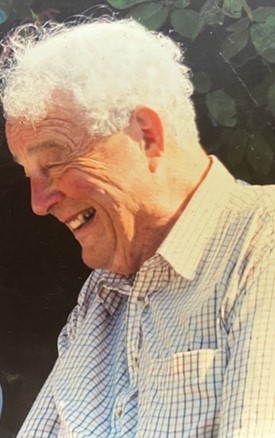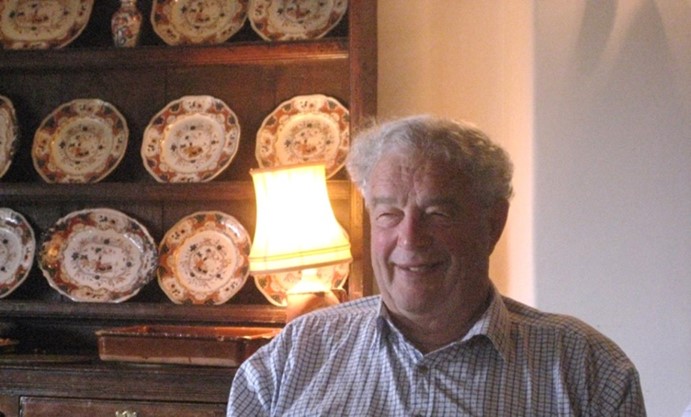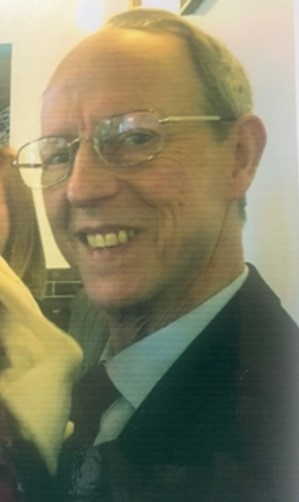This is the 2024 obituaries page
To view 2013 click here
To view 2014 click here
To view 2015 click here
To view 2016 click here
To view 2017 click here
To view 2018 click here
To view 2019 click here
To view 2020 click here
To view 2021 click here
To view 2022 click here
To view 2023 click here
To view 2024 click here
"REQUIEM AETERNAM DONA EIS DOMINE"
OBITUARIES 2025
Major David Gybrian Flood TD KSG (51)

His wry smile
John Flood writes:-
David Flood (51) was the second of five children born to Dr Phillip and Molly Flood, nee Arbuthnott. His siblings were Tim, later Dom Edmund Flood OSB (48) Mary Ann, later Sr Mary Ann Flood CJ, Philippa Beck and John Flood (65). His paternal grandmother was Cecelia Tolhurst; consequently, the Flood boys were part of one of the two largest families in Beaumont’s history, the Tolhursts and the Russells.
Part of his childhood was spent in Tunbridge Wells. During his childhood he spent much of the school holidays staying with his aunt at Newlands Farm near Crowborough which had a substantial impact on his enduring love of the English countryside and in particular riding horses, at least until he became too heavy for a horse to be able to carry him. On account of the war and his parents’ flat in Wimbledon being very close to a bomb falling on a neighbouring property, he was sent at the tender age of 6 to his uncle’s boarding school, Penryn, which had just been evacuated from Edgbaston to Gayton Hall at Upton Bishop near Ross-on-Wye. He would later recall that it was not long into his first term when he was caned for the first time and was told afterwards by a senior boy that “it is not the done thing for boys at this school to blub”! When Tim moved to Beaumont in 1944, David transferred to St John’s Beaumont which he later said was the school he most enjoyed. At Beaumont he greatly enjoyed the Scouts, Rugby and Rowing. He told me that he won a pot at Egham Regatta as a sculler. He told my son, Andrew, that there was a tradition in those days that each year the 1st VIII raced the scrum from the 1st XV, but with the 1st VIII cox in the 1st XV boat and the handicap of the heaviest boy as the cox for the 1st VIII. David was therefore the 1st VIII cox and complained of his back being damaged when they failed to throw him far enough into the river! David by then was a monitor. After school, when in this country he played rugby for Wasps.
David was lucky as he did his National Service in Hong Kong where he acquired a Rolex watch. At the end of this he joined the 2nd Royal Tank Regiment and rose to the rank of major by the time he left the Army at the age of 35. In his Army days he had spent time as an instructor at Mons, at Bovington, in Libya, Northern Ireland and Hohne in Germany, where he was Adjutant. While in Northern Ireland in 1963 he travelled the length and breadth of Ireland to visit the Beaumont Senior Scouts for a weekend, who were camping at Derrynane in County Kerry.
At the age of 22 he wrote to his cousin, Michael Bohane (49) “I hereby certify that on this the 11th day of February 1956, a wife is an unnecessary extravagance; I can only afford a wife, or a car, and I will get a lot further with a car than a wife”! He remained a bachelor with a military bearing all his life.
When David left the Army he joined Scaffolding Great Britain (SGB) where he insisted on initially being a scaffolder before becoming a director, initially in England, and later for Europe. His interest in cars led to him being responsible for the SGB fleet of vehicles. He found jobs in the company for many of his subalterns in the army for whom he retained a keen interest which often extended to their children’s wellbeing. To support those at SGB who needed a holiday, he arranged for SGB to buy an apartment beside the sea on Menorca which he travelled to both to open it up in April and to close it down in the Autumn. On taking early retirement at the age of 55, SGB decided that they no longer needed these premises and intended to sell it, until David reminded them that under Spanish Law it hadn’t been possible to buy it in the company name, so it was in his name, and it might as well stay that way! Their acceptance of this suggestion has enabled the wider family and many others to greatly enjoy their time there over the last 37 years – Deo Gratias!
Skiing played a major part of his life at Alpbach in Austria, a popular skiing resort for the British Army. He would visit there three times each winter, including at Easter. He became the President of the local skiing association and would preside at the annual ‘Summoning of the Snows’ autumn lunch. He introduced all our children to skiing and very nearly left one at a service station enroute.
Lourdes was also a very special destination, twice each year, following his first visit on the International Military pilgrimage of 10,000 services personnel. He would go in June to do a week in the Stage group with the Hospitalité Notre-Dame de Lourdes. For 35 years in July, he would travel as a helper with the Arundel & Brighton Diocesan Pilgrimage, latterly as a beneficiary. He once timed his European schedule for visiting SGB depots so that he could spend a couple of nights with HCPT Group 24, which led to him later offering hospitality to the group annually for the group to hold their preparation weekend at his home. When asked why he so generously supported the group, he said simply “I like what you do”.
In April 1982, having sold the family home in Wimbledon the previous August, David purchased Lakestreet Manor, Mayfield which was to be his home for 43 years, 36 of them in retirement. His death announcement referred to him as “an exceptionally generous brother, uncle, great uncle,

Supreme host
friend and host”. His table was constantly loaded with roast lamb reared on his fields with all the trimmings and many other dishes, liberally washed down from his cellar. The 8 bedrooms were full for many weekends. Hospitality was important to him, and his home was his pride and joy. Amongst those he entertained would often be a dozen or more of the clergy or the remaining Holy Child nuns from Mayfield Convent, including Sr Jean Sinclair, the headmistress and daughter of Sammy. My family of 17 gathered there for a pre-Christmas lunch when his gardener, Dom, planted a special red Oak Tree in his memory in a position visible from the country lane that leads past the Manor.
He spent most of his years at Lakestreet as the equivalent of a PA to two parish priests, Frs. Stephen Tynan and Mario Sanderson, including roles as chair of finance, sacristan, Eucharistic Minister and chauffeur to Fr Mario. At his funeral Canon Tom Trehearne spoke of the day his sister, as catechist for the 1st communicants, asked a little boy “Who owns the Church”? The answer came “David Flood”. She responded, “Why do you say that?”, and the boy answered, “He always opens the door to us”, which was indeed the case! Brian Burgess (67) asked David to take on the Chairmanship of the St Barnabas Society. On Brian’s death David took on his role as sacristan for the annual Mass at the Beaumont War Memorial. For all his involvement with the Church he was made a Papal Knight of St Gregory.
In his own words, David died “aged 91 and 1/3rd“ and at that age, with so many of his contemporaries preceding him, it was remarkable that the Convent Chapel was completely full, with 8 priests concelebrating, 14 OB’s and OSJB’s on the Sanctuary to sing the Carmen, amongst a congregation of over 250 people, with maybe a not dissimilar number watching the livestream from at least 14 different counties. This recording remains available at www.funeralstreaming.co.uk/viewing-room/47349
Amongst the condolences, the descriptions we received of him are “Incredibly generous, extraordinary, outrageous, bombastic, kindly, unique, a superb host, hugely endearing and unrepeatable”!
He had a steadfast faith. Fr Mario once wrote “I know him as the one parishioner in any and every parish that I have served in, who has done more for me than any other. He can indeed be very obstinate, but a kinder person could not be found”. He was above all a family man. David’s grave is within squabbling distance of Fr Mario’s, albeit on a slight elevation. May they rest in peace.
Alan Mitchell (65)

John Flood writes:-
Alan was one of 7 children, born to Dr Thomas Mitchell and Mrs Betty Mitchell, the family living in Radlett in Hertfordshire. His siblings included two brothers who went to Beaumont, John (55), now deceased, and Hugh (61), who overlapped with the Class of 60, but not with Alan who was amongst several of our year who arrived a year late in 1961. Mickey Parish (65) recollects that, on arrival at Beaumont, he and Jonathan Vickers (65) and Alan formed a coterie and went around together. Alan never married but is said to have had a number of girl friends in his youth. He did business studies at the Regent's Street Poly and at that time shared a house near Ladbroke Grove with another student, who was at his funeral, who kept up with him thereafter. Alan worked in IT at a London hospital.
The tributes which were paid to him at his funeral indicated that after his father died, he looked after his mother, perhaps for many years. He is said to have regularly attended at St Anthony of Padua Church in Radlett and to have been involved in the singing there. He had an interest in cars and played squash. He would travel there each weekend from his home in Shepherd’s Bush. Amongst the tributes paid to him at the wake were references to his dependability, practical and welcoming nature, his smile, his fun and his sense of humour.
Alan attended several of the Class of 60 dinners and was always good company. With the onset of Covid, he also joined, with around 20 others from his year, the weekly Zoom. John Devaux (65) has commented “My own memory being so poor I was envious of Alan's ability to recall accurately and in detail events of more than fifty-five years ago.” Several others have mentioned his exceptional memory of his time at Beaumont and that in the Zoom meetings he regularly corrected statements made by others, often adding a lot of detail of whatever was being discussed.
Very sadly, it was clear from the tributes that were shared at the wake that Alan suffered from depression and loneliness. His retirement and the onset of Covid were more or less simultaneous, and it seems that these coinciding affected him very badly. I do recollect him, at some stage during Covid, asking me to remove him from the invites to join the Thursday afternoon Zooms. In retrospect I regret we didn't realise at the time that he was almost certainly lonely and depressed and therefore failed to try to help him, but I was reluctant to breach his declared request or invade his privacy. When, before the funeral, I spoke with his younger brother, Francis (who went to Worth as Beaumont had closed), he advised me of the tragic news that Alan had taken his own life. Again, John Devaux commented “That he came from a large family does not appear to have enabled him to conquer his demons. For someone single and so vulnerable retirement came at a bad time. My own retirement came some six months before the onset of Covid. Fortunately, I had a family to prevent my becoming too introspective, had there been any danger of my doing so. Alan's story reminds us that family and friends should never be taken for granted”. We will never know whether we could have done anything to enable him to live a longer and more contented life, but we certainly know that Alan added a lot to his family’s lives and to the lives of his Beaumont contemporaries, many of whom greatly valued his company and endearing manner and friendship. How we wish he was still with us. May he rest in peace.